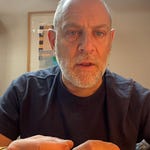Playback speed
×
Share post
Share post at current time
Share from 0:00
0:00
/
0:00
Transcript
Tough Truth & Love on this Shabbat of Vision
Weekly Vid Recap of Below the Bible Belt
Aug 09, 2024
This shabbat has a special name and purpose. It’s called Shabbat Hazon - the Sabbath of Vision -- and it’s the one that comes right before the Ninth of Av - our saddest day of the year, recalling the traumas of destruction and despair, exile and loss. According to Jewish history the Jerusalem Temple was destroyed twice - around this midsummer date. Other historical tragedies also occurred at this time.
Why is it named ‘vision’? The words of the prophet Isaiah, in Jerusalem 2,700 years ago, who warned of this dire outcome, are chanted aloud on this Sabbath, a vision for all time - a warning -- not to devolve into an immoral society, not to let the zealots run the show because that will lead to disaster.
But they didn’t listen or see his visions — and the disaster came.
Well. Here we are again.
Have we not been listening, all these years, to Isaiah, to the other visions of rebuke, call to morality and ethical justice?
Must the violent visions of intergenerational trauma revisit us and all who we are in contact with?
These painful questions were echoed this week - along with a few hesitant yet hopeful responses -- in the chapters of the Psalms that we’ve read below the bible belt.
We had poems about the yearning to nest in peace like the birds that call the temple mount their home , and poems about Jerusalem being the birthplace of the world. We also had psalm 85 that includes both the lament for the losses and the wild visions for a future of reconciliation and radical repair.
The angry poet hurls at God:
הַלְעוֹלָ֥ם תֶּאֱנַף־בָּ֑נוּ תִּמְשֹׁ֥ךְ אַ֝פְּךָ֗ לְדֹ֣ר וָדֹֽר׃
Will You be angry with us forever, prolong Your wrath from generation to generation?
And those words hurt today so much. Yes, 2,500 years after these words were written we are still dealing with the same fears and questions. It is not just the anger at the creator but the anger at us, the creations, who keep creating chaos instead of order, greed instead of care, war instead of peace.
And - there is also insistence, and assurance, that though we may be stuck in same-old patterns, at least for a painful while - there will yet be better days.
There will be that famous kiss of peace and justice.
And the honest truth of healing, that truth that we are all created equal and deserve dignity and defense and equity and equality -- this truth will rise from below, from the grassroots of activism and will change it all -- for good, for all:
אֱ֭מֶת מֵאֶ֣רֶץ תִּצְמָ֑ח וְ֝צֶ֗דֶק מִשָּׁמַ֥יִם נִשְׁקָֽף׃
Truth will spring up from the earth;
As justice looks down from heaven.
Hope is a muscle. We must keep exercising and keep it in good shape, even as we continue facing tough truths and protesting evil.
This psalm reminds us that it’s on us to manifest the radical reality that we are yearning for - and that our work below will bring about the change from above. Both within each one of us and in all layers of reality.
The next Shabbat that’s coming up also has a special name, Shabbat Nachamu - the Sabbath of Consolation, with focus on healing and hope.
Our psalms, prophetic poems and sacred texts contain, like us, the complexities of the human experience, messy with multiple narratives and aspirations.
Who knows where we’ll be next week and what consolations will be needed — but today, on the eve of this Shabbat, in the middle of so many sorrow and uncertanity — may we rise up and raise up visions of tough truth and tough love - radical justice and peace everlasting, for all.
I hope we take the time to grieve, hold each other’s hand, and rise from the rubble of mourning to bring about a better day.
Thank you for joining me below the bible belt. kind days.
Shabbat Shalom.
Recent Posts












Share this post